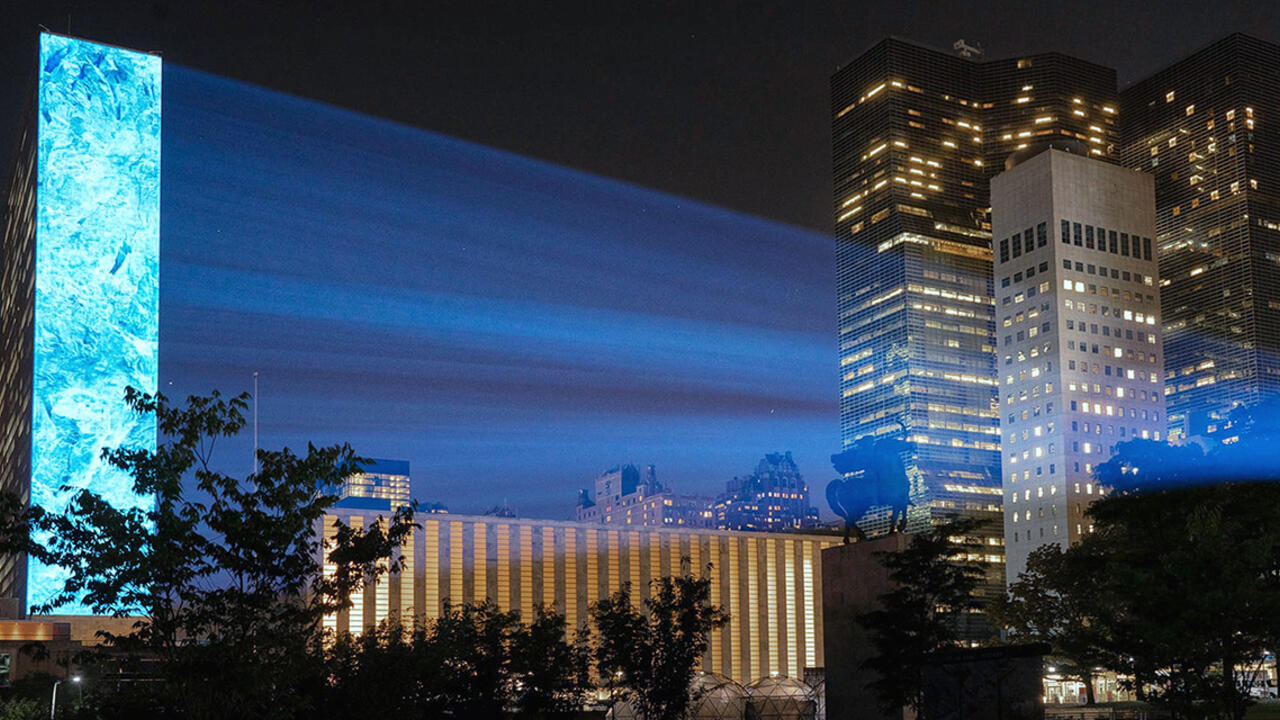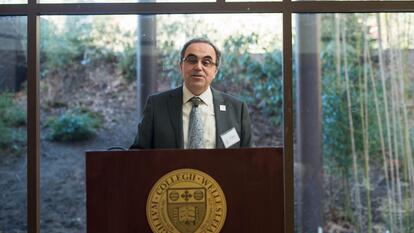Five Takeaways from the UN General Assembly Session

At the annual United Nations General Assembly session’s high-level general debate, which opened September 24 in New York, representatives from each of the UN’s 193 member states gave speeches laying out their governments’ views on major issues facing the world; small groups of leaders met face to face and addressed the global press; and UN members convened with representatives from nongovernmental public interest groups.
Below, Craig Murphy, Betty Freyhof Johnson ’44 Professor of Political Science at Wellesley, picks the five most interesting takeaways from the week of speeches, meetings, and discussions.
On addressing climate change, public interest groups, the UN staff, the governments of smaller nations, and those of the EU are way ahead of most of the major carbon producers.
The United States avoided the climate summit, and China, which had been expected to commit to new greenhouse gas reductions, did not. The words of 16-year-old Swedish activist Greta Thunberg were heard around the world, and UN staff had them scrolling up all 39 stories of the iconic Secretariat Building while Secretary General António Guterres rounded up commitments from over one-third of UN members to achieving carbon neutrality by 2050. At the same time, in an unprecedented move, the former secretary general, Ban Ki-moon, was also in New York with members of his old scientific advisory group, rallying for similar commitments from presidents of universities around the world, notably including those in countries whose leaders are major climate deniers, such as Brazil, Russia, and the United States. Similarly, scores of global industrial companies made commitments, some promising carbon neutrality by 2025.
Carbon commitments became a topic of high politics.
The most important climate news may have come in a speech by French President Emmanuel Macron who urged—and said he expected—EU and other climate leaders to use aid, trade, and financial leverage to punish governments that refused to move rapidly toward and well beyond their 2015 Paris Agreement commitments. The clear message was that the U.S., Russia, and others can expect to pay for their recalcitrance.
I don’t know if he explicitly stated this stance, but it was the first time the threat has been made in such a public, global forum. While it is unclear if there was coordination among EU leaders, it is not the kind of statement that Macron would have made without knowing that he had important allies. The Green Party had a major win in the recent EU elections, and they will be the kingmakers after the next German election—and will be playing similar roles in other countries as well.
For the big powers, domestic politics still tops global problem-solving.
In most of the English-language press, the biggest UN story of the week was Boris Johnson rushing back to London to attend the Parliament that the Supreme Court ruled he had illegally closed, while Donald Trump caucused with his staff to respond to the House Democrats’ decision to start an official impeachment inquiry. While it is always the case that, for the great powers, domestic politics tops global cooperation, I have never seen it demonstrated more dramatically.
The new “International” of the authoritarian right.
In the last few years, one of the big topics in the study of international institutions has been the peculiar and somewhat paradoxical “internationalism” of the authoritarian right-wing regimes during the League of Nations era. Leaders of Italy, Spain, Portugal, and, later, Germany and Japan regularly met at or at the same time as meetings of the League Assembly about the horrors of “cosmopolitanism” and contrasting true international cooperation of “patriotic” nations whose governments believed in absolute rights of their state and people. By the late 1930s, these governments had created a few parallel organizations of a kind of “fascist internationalism” and, during the war, they took over a number of the global intergovernmental organizations, including Interpol. The first few speeches at this year’s general debate sounded very similar. Due to a long-standing UN practice, Brazil’s right-wing populist president spoke first, followed by the leader of the host nation, Donald Trump, and the rhetoric of the two men—contrasting the horrors of “globalism” to the glory of “patriotism”—sounded very much like the 1930s. A few similar speeches followed, but, while the rhetoric may be the same, today’s right-wing nationalist regimes have yet to form the kind of “International” that linked their predecessors.
Most of the best speeches aren’t covered in the news.
On the first day of the debate, September 24, speeches by the prime ministers of Slovakia and New Zealand and by the president of Senegal were cases in point of this frequent truth. Jacinda Ardern of Aotearoa/New Zealand gave a beautiful speech about guardianship, of our planet and each other. She began, appropriately, in Maori, to discuss the global relevance of a Maori concept. Macky Sall of Senegal gave a thoughtful, difficult address recognizing the depth of the crises of climate change and right-wing populism while at the same time honoring the real fears of so many whose countries have been devastated by terrorism. The refrain was “peace is diversity” and “the United Nations is our home.”
Photo: During the U.N. general assembly last week, artist Joseph Michaels’ installation Voices for the Future illuminated the United Nations building.
One section of the installation (pictured), Antarctica: While You Were Sleeping, depicts an iceberg slowly crashing down the building. Another piece projected the words of Greta Thunberg and six other young environmental activists against the 500 foot building. The installation, a collaboration between the United Nations and Project Pressure, highlighted the urgency of addressing the global climate crisis.



